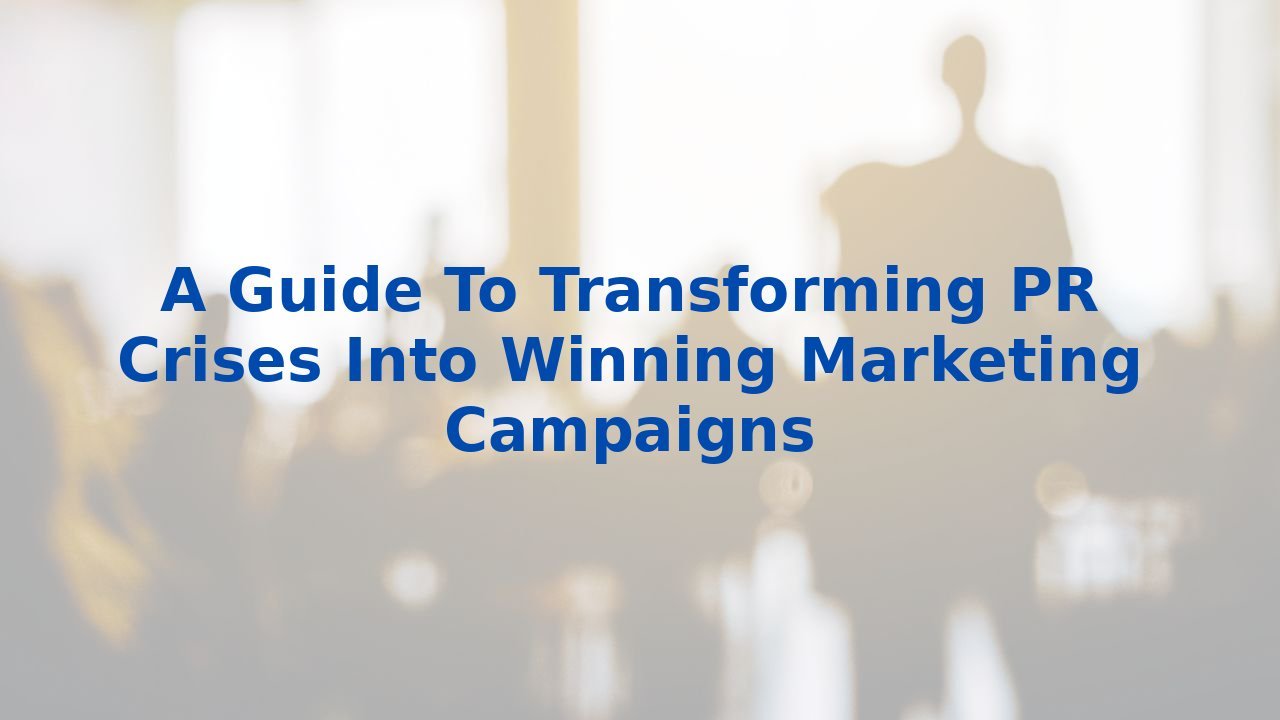A Guide To Transforming PR Crises Into Winning Marketing Campaigns
A Guide To Transforming PR Crises Into Winning Marketing Campaigns
The New Reality of PR Crises
In today's fast-paced digital landscape, the potential for a public relations crisis lurks around every corner. The immediacy of social media means that all organizations—no matter their size—are susceptible to the fallout of negative attention. However, what if your company didn’t just survive a crisis but turned it into a brilliant marketing opportunity? This guide explores how businesses can navigate the tricky waters of PR crises and leverage them for greater marketing success.
Understanding the Business Process
At the core of transforming a PR crisis into a winning marketing campaign is a robust internal business process. This entails a clear crisis management strategy that not only identifies potential issues but also outlines swift and effective responses. The components include:
1. **Identification:** Recognize potential crises before they escalate.
2. **Assessment:** Assess the severity and potential impact on your brand.
3. **Response:** Develop a strategic response that addresses the issue head-on.
4. **Opportunity:** Create marketing narratives that can reshape perceptions positively.
The Power of AI in Crisis Management
Artificial Intelligence can be a game-changer in enhancing each of these business processes. By integrating AI into your crisis management plan, you can improve efficiency, speed, and accuracy.
Identification
AI-driven analytics tools can aid in detecting potential crises before they escalate. By analyzing social media trends, customer feedback, and news cycles, organizations can identify warning signs early. The advantage lies in not just recognizing the issue, but also understanding its roots and implications, allowing for timely interventions.
Assessment
Once an issue is identified, AI can assist in evaluating its impact. Machine learning algorithms can analyze historical data to predict the potential fallout on brand reputation, allowing companies to tailor their responses appropriately. The result? An informed decision-making process that mitigates risk.
Response
AI can help design a cohesive and strategic response plan. Automated communication tools can enable real-time responses, maintain transparency, and provide clarity during turbulent times. This level of responsiveness can help maintain audience trust and brand integrity.
Opportunity
After addressing the crisis, it’s time to pivot to opportunity. AI can analyze customer sentiment and market trends, enabling companies to craft compelling marketing campaigns that resonate with their audience, showcasing resilience, accountability, and growth. The strategy should focus on not just overcoming but thriving—a powerful testament to your brand's values.
Embedding AI for Continuous Improvement
For organizations, embedding AI isn’t just about managing a crisis; it's about continuous improvement. Regular training of employees on AI capabilities is vital. Investing in AI training enhances staff skills, fosters a culture of innovation, and equips teams to utilize AI tools effectively during crises and beyond.
The Benefits of Employee Training in AI
When employees possess a strong foundation in AI, they can better anticipate and address crises. They become adept at utilizing analytics for decision making, ultimately leading to more informed marketing strategies. Training staff on AI isn’t just beneficial; it’s essential for fostering a resilient organizational culture.
Conclusion: Turning Challenges into Opportunities
Crises can be daunting, but they also present unique opportunities for growth and innovation. By implementing robust processes and embracing the power of AI, organizations can transition from reactive to proactive marketing strategies. The outcome is not just a stronger brand reputation, but also a deeper connection with audiences, proving that every challenge can indeed pave the way for remarkable opportunities.
To further harness the potential of AI in your organization, consider AI training programs that equip your teams with critical skills for today’s fast-evolving landscape. Your ability to turn a PR crisis into a marketing success story hinges on preparation, responsiveness, and the right knowledge.



